Malcolm R. Campbell's Blog, page 223
September 30, 2013
Write sloppy, then cut
 Beginning writers often lack the confidence to write sloppy, anything-goes first drafts. Veterans will tell you these writers have an internal editor that judges every word before it reaches the page or screen.
Beginning writers often lack the confidence to write sloppy, anything-goes first drafts. Veterans will tell you these writers have an internal editor that judges every word before it reaches the page or screen.
Sometimes the internal editor looks like Mom, Dad, Reverend Johnson or Professor Smith in the English department. These people have opinions about writing, right and wrong and what you ought to do with your life. If you can hear them saying “tisk tisk” while you write your first draft, that draft is probably going to be anal.
Neither your imagination nor your flow of words needs to be restricted when you write the first draft.
It also takes confidence to cut words. Veteran writers refer to a writer’s favorite scenes and sentences as “your darlings.” These are wonderful in the wrong way. They’re funny, tragic or the best poetry you’ve ever seen. The problem? They don’t fit the story.
Many students in a creative writing or basic news reporting classes are shocked when their short stories and practice news reports come back marked with a red pen. Instructors cut unnecessary words we use in conversation but shouldn’t be using when we write.
Adverbs have a bad reputation. Adjectives are next on the list of suspects. So are weak verbs. Look at each one while you’re cutting words and see if it adds anything to the sentence.
On Facebook these days, it’s rather a fad to say “I’m totally addicted to this TV show.” The word “totally” adds nothing because addicted is addicted. Many TV news reporters didn’t get the message when they took basic reporting in college and heard the instructor say “stop using the words ‘totally destroyed.’” A destroyed condition is already total.
Saying “so totally addicted” might sound “in” on Facebook and at the local mall, but the words slow down your writing. Worse yet, they date your writing; by that I mean, once they do out of style, your story will go out of style, too.
Consider this exercise: Look for short story and creative nonfiction writing competitions with strict maximum word counts. Think of a plot or subject and then write the first draft with the idea that you’re going to have twice as many words as you need. Now cut the first draft so it fits the competition’s requirements. You’ll be amazed at how much stronger the work becomes when the unnecessary words are polished away.
Sculptors have said that creating a statue out of a block of marble is a process of taking away the unwanted stone. You’re doing this when you delete the words you don’t need. The resulting writing sings just as the sculptor’s best work looks like stone that lives and breathes.
Your first-draft sloppiness gets all the ingredients in place. Editing smooths away everything that will get in the way of the final story.
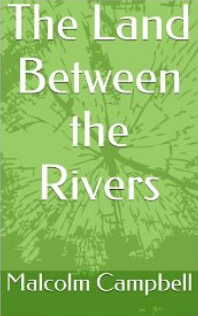 Malcolm R. Campbell is the author of contemporary fantasies, folktales and paranormal short stories. His latest three-story set, “The Land Between the Rivers,” was released on Kindle September 29.
Malcolm R. Campbell is the author of contemporary fantasies, folktales and paranormal short stories. His latest three-story set, “The Land Between the Rivers,” was released on Kindle September 29.


September 28, 2013
Spotlight: ‘Jock Stewart and the Missing Sea of Fire’
“Small town hi-jinks delivered with healthy doses of sarcasm and wit. Jock Stewart is like Guy Noir freed from the confines of public radio. A must-read for anyone who likes their sleuths hard-boiled, their women salty, and their plots with as many twists and turns as a plate of the Purple Platter Diner’s spaghetti.” – Nancy Whitney-Reiter
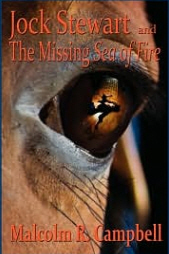
Less than five bucks on Kindle
The Story: Jock Stewart is a fast-talking newspaper reporter who is on the trail of a missing racehorse named Sea of Fire. Will he find the horse or will the inept police department get in his way? And what about his girl friend Monique, the gossip columnist in the little black dress? None of this probably matters because, in a comedy/satire, nobody really expects everything to add up by the end of the book.
How it Starts: Jock Stewart woke up this morning with an industrial strength hangover. An empty Scotch bottle lay on the floor next to an empty little black dress that wasn’t his. Last night, a fair amount of Monique Starnes wore it at the newspaper’s office party. Her cleavage, more out than in, was deep enough to kidnap a man’s dreams. Now, there would be hell to pay.
Food at the Purple Platter Restaurant: Smith leaned back in his chair, slightly reducing the smell of fish. Jock hadn’t eaten much of his meal anyhow since as best he could recall, most Denver omelet recipes didn’t include coffee grounds, cigarette ashes, and miscellaneous unidentified material that appeared to have come from a dustpan.
Some asshole dropped the omelet and scooped it back on the plate.
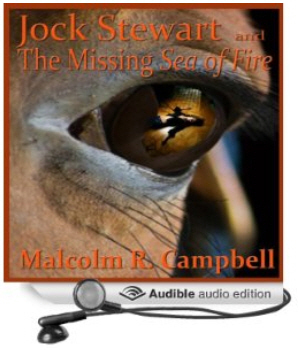
Or, you can listen while driving to work
Clark Trail, the Mayor: According to randomly informed sources, the mayor presumed that when the former Muskrat & Company Factory, manufacturers of lead, arsenic and asbestos dinnerware since 1921, was selected as the county’s number-one EPA site, he had the perfect venue for handling “granny’s healthcare needs.”
Councilman Calvin Knox told reporters that the mayor’s venue was as “perfect as consigning granny to an ice floe and waiting for nature to take its course.”
Lucinda Trail, his Wife: She put her hand on his arm, guiding him to a circle of white, wrought-iron chairs in the patio at the west end of the house. There was water on the tile and the chairs appeared to have been recently washed. Obviously, she didn’t want him inside the house where, possibly, the mayor might be sprawled in a pool of blood in the foyer, caught in the act of sneaking out of the house for his tryst with Bambi or the Lady in Black. He wondered whether the headline should include TRAIL’S END or TRAIL MIX.
How it Ends: It was the kind of question most guys on the planet went their entire sorry lives without ever being asked.
Do you ware to read all the stuff in between these snippets? If you’re a Clark Trail kind of guy, you probably won’t. If you wear a little black dress, you probably will. At least, that’s my story and I’m sticking to it.


September 24, 2013
‘The Seeker,’ ‘The Sailor’ and your novel via e-book lending
 I’m happy to announce that the first two contemporary fantasies in my “Garden of Heaven” Trilogy are now available for e-book check-out in Banks, Barrow and Jackson counties in Georgia via the Piedmont Regional Library. (If you live in those counties, click on the graphic to learn more.)
I’m happy to announce that the first two contemporary fantasies in my “Garden of Heaven” Trilogy are now available for e-book check-out in Banks, Barrow and Jackson counties in Georgia via the Piedmont Regional Library. (If you live in those counties, click on the graphic to learn more.)
If you’re a small-press author, your publisher may distribute books to some outlets, including libraries, via Smashwords. If the public libraries in your area don’t also use Smashwords, this will be a roadblock to getting your e-books into the system.
I live in the metropolitan Atlanta area where the multi-county library systems have standardized on e-book lending managed by OverDrive.
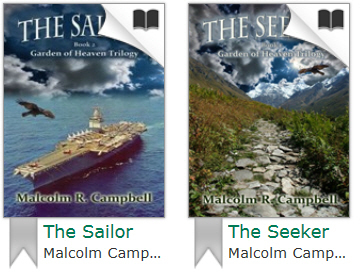 While I’ve donated paperback copies of my novels to many libraries in the area, they didn’t have my e-books because their lending systems weren’t the same one my publisher uses. When I talked to the Piedmont Regional Library about this, they said that OverDrive has a provision that will allow libraries to upload an epub file into the system.
While I’ve donated paperback copies of my novels to many libraries in the area, they didn’t have my e-books because their lending systems weren’t the same one my publisher uses. When I talked to the Piedmont Regional Library about this, they said that OverDrive has a provision that will allow libraries to upload an epub file into the system.
This provision allows libraries to carry indie author and small press books that aren’t available in OverDrive. Since many libraries have prided themselves on having what I call a “buy local, read local” approach, ask your librarian about this provision and whether or not they have used it as yet. If your books are on Smashwords, you have easy access to an epub version.
Unless you’re widely known in your community and/or have been very active in Friends of the Library and other similar activities, you’ll probably have to take the initiative on getting your books accepted into your public library’s system. Send the library an e-mail after learning which e-lending program they use.
You will probably have to donate the ebpub file, but it’s a small price to pay when you think of all the people who will be able to enjoy reading the book.


September 17, 2013
Dialects Specialist and Actor becomes Storyteller for New Audio Book

R. Scott Adams
Today’s guest is radio and television character and voice actor R. Scott Adams who narrated and produced the new audio edition of my comedy/satire novel Jock Stewart and the Missing Sea of Fire. Scott claims—and I have no reason to doubt him—that he “fell out of the womb a natural mimic and began telling jokes and performing skits almost as soon as he could talk – much to the chagrin of his family.” His Seattle company, offering “The Whole World in One Voice,” is called Dialects on Demand.
Malcolm: I liked your approach to the narration of Jock Stewart and the Missing Sea of Fire because it brought out the attitudes and eccentricities of each of the characters. With your focus on voices and dialects, do you automatically “hear” the characters in novels whenever you read a book for pleasure at the end of a busy day?
Scott: Hi, Malcolm, thanks for having me here today to interview. Yes, when I read, I rapidly come up with a voice in my head for each of the recurring characters. I usually don’t have one when I start off a book, but as their personality or primary character traits appear, their voices start coming to me and before I know it, I am hearing each specific voice in my head as I read their dialogue.
I think that ability does make it easier for me to come up with the appropriate voice for characters that I am performing. For instance, your character Coral Snake Smith struck me as someone who has a high 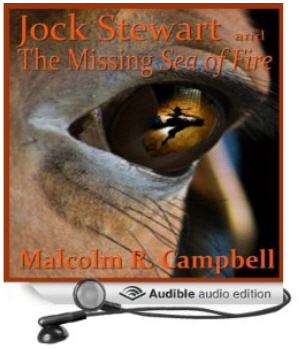 opinion of himself and talks down to Jock. From Jock’s point of view, Smith is useful, though kind of disgusting. How to combine that? Give him a somewhat self-righteous, “better than thou” voice, but make it unpleasantly high and nasally.
opinion of himself and talks down to Jock. From Jock’s point of view, Smith is useful, though kind of disgusting. How to combine that? Give him a somewhat self-righteous, “better than thou” voice, but make it unpleasantly high and nasally.
Malcolm: As Jock would say about Coral Snake Smith, “you got that right!” What led you to add novel narration and production to your work at Dialects on Demand? Was it an intuitive and natural extension of the business or did a muse out of nowhere suddenly present you with the idea?
Scott: Looking back on it, I consider it the culmination of a number of semi-related events. I love books, and have been a reader since I was a child. I still read voraciously. In my career I worked in several bookstores, and, among other duties, often wound up reading stories to children in the store and even in local schools as part of the stores’ literacy outreach program. I received a lot of compliments and requests for return performances from the teachers and parents. I found I really enjoyed doing this, and even read mainstream fiction to a couple of my girlfriends, who told me I should do it for a living.
Malcolm: Reading to children is a good way to get into the business. If you can keep their attention, you’re in the groove.
Scott: Fast forward a few years. I’ve started Dialects on Demand, but it hasn’t occurred to me to focus on reading novels as part of my primary business. A good friend of mine, Laura Holt, told me about a new web site called Audiobook Creation Exchange (ACX), wherein I could audition for any book on the exchange that drew my attention and was seeking a male narrator. I was immediately drawn to this idea, and after looking over the site and seeing how it worked, began seeking a novel that I liked and felt would be a strong match for my repertoire of voices. I laughed out loud at the opening sentence of “Jock Stewart and the Missing Sea of Fire,” so it was a no-brainer to submit my audition for it as soon as I could book time with Ben Shenberger, of Subzero Audio (http://subzeroaudio.com), where I do all of my recording work. I was really excited when I heard back from Kimberlee Williams at Vanilla Heart Publishing, that I had been selected as the voice for “Jock Stewart.”
Malcolm: As I listened to your narration, I thought of the old-time tradition of storytellers traveling from town to town with entertaining stories. How do you achieve the old-style storyteller-spinning-yarns around a campfire effect in audio book production?

Rehearsing as the host of an imaginary talk show.
Scott: Thank you for saying, that, Malcolm. I consider that really high praise. The short answer is that, as I narrate a story, I see it unfolding in my head, and it then falls to me to add the inflection and pacing needed to best convey the feel of each scene, as well as that of the characters.
To add a bit more context, my father was a born story-teller, and I apparently inherited the gift. I’ve already mentioned I was a mimic from the get-go; as it happens, I was a raconteur as well. I began adding sound effects and giving characters individual voices any time I told an anecdote when I was still a little boy. I think it was a natural extension of the mimicking, really – I made up the different voices, so shouldn’t I also include the various sounds that set the scene? This ability improved with age and experience to the point where people would let me know my stories made them feel like they were right there in them as they happened. This, of course further encouraged me, so that now I can’t really imagine telling them any other way.
Malcolm: As a writer who majored in radio/television and then strayed over to the dark side of print, I’m fascinated by the ways a narrator approaches an audio book production. When a new book arrives, how do you approach it? Do you have a series of steps you follow for each book before you step into the recording studio?
Scott: Well, you have to keep in mind that this was actually my first audiobook recording. Some things were obvious, but I’ve also learned a number of things the hard way that I am definitely bringing into my process as I prepare for and narrate future books.
The first thing I do is to read the entire novel. I want to know the whole story so I can pace scenes and know where to place the most tension and suchlike. It’s a little bit like thinking about what the background music of each scene should be in a movie. Most people don’t really consciously notice the music, but take it out and the scene comes across very differently. It’s the same here – if I don’t pace things correctly, the book loses something – in a really severe example, it could even fall flat.
I take notes of any questions I have while I’m reading, so once I’ve read it, I’d really like a chance to ask the author any questions I have, though sometimes speaking with the editor will also work fine. For instance, when Kimberlee confirmed my impression that Jock Stewart took place in a small Southern town, it really helped open up my voice repertoire. I grew up in North Alabama – I can do Southern voices and dialects for days.
Malcolm: Those of us who live in the South notice right away whether an accent purportedly from our neck of the woods is Hollywood phoniness or genuine! Alabama is a good place to learn Southern.
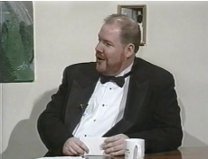
Co-hosting a segment for the 2000 Addy Awards in North Alabama.
Scott: Once I know the story, basic pacing, and have answers to my questions, I go back through the entire novel again and literally highlight each character with a different color marker. If there’s a scene with a lot of secondary characters in it, I may even write one or two word notes to remind me which voice I’ve assigned each of those minor characters. That latter is of course not needed with the major characters, but for instance, in that one news room scene in “Jock Stewart,” you had over a half dozen background characters – none of whom, if I recall correctly, showed up in the rest of the book. I definitely needed notes for the voices in that one!
Malcolm: In the studio, how much do you read at a time before your voice needs a rest?
Scott: Usually 45 minutes to an hour. I can stretch an hour out a little, but sixty minutes is my average for a session.
Malcolm: How is the production of an audio book different from, say, a commercial with characters in it or a television or film narration project?
Scott: Most television and radio commercial spots are done in straight single-voice narrative. If two major characters are speaking, you’re generally working with a second voice actor doing the other voice. Either way, in commercials pacing is always important, but time is the critical factor – the spots are set length duration – often thirty seconds, and you have to fit all the words the client wants to include into that short, specific length of time without sounding rushed.
As to film narration, I have only done business film work, no movies, but again, I use a single voice. There the main thing is, again, pacing, but also speaking with the writer or business manager beforehand to ensure I know what should be emphasized versus what is more of a detail.
Malcolm: If the radio dramas of past years ever returned to popularity, would you be one of the first actors in line for a chance to play a role in a modern interpretation of “The War of the Worlds,” “The Lone Ranger” or “The Shadow”?
Scott: Absolutely! Performing characters in animation and/or radio drama would be my dream job. As to the specific broadcasts you mention, I am a huge fan of pulp stories from the 1930’s and 40’s, so “The Shadow” would be perfect, though I’d thoroughly enjoy doing any of those you listed.
Malcolm: Where can fans of your work find you: commercials, films, plays, other audio books?
 Scott: I appreciate your asking, but up until “Jock Stewart,” the vast majority of my work was for private companies or small Southern businesses. I’m looking around for some regional theatre here in the South Seattle area, so hopefully I’ll be in a few plays around Puget Sound in upcoming years, but nothing specific at this time. I definitely hope to be found as the narrator on an increasing number of audiobooks, and people who are interested can always reach me through my Dialects on Demand web site.
Scott: I appreciate your asking, but up until “Jock Stewart,” the vast majority of my work was for private companies or small Southern businesses. I’m looking around for some regional theatre here in the South Seattle area, so hopefully I’ll be in a few plays around Puget Sound in upcoming years, but nothing specific at this time. I definitely hope to be found as the narrator on an increasing number of audiobooks, and people who are interested can always reach me through my Dialects on Demand web site.
Malcolm: Is there anything I should have asked you about voices and dialects?
Scott: I’m hoping to get a chance to explore a wider variety of the various accents and dialects that I do in my future work. I had a lot of fun doing all the different Southern voices and dialects in “Jock Stewart,” but I have a lot of breadth across different accents, so doing a book in, say, a series of British dialects or something like that would be great.
Malcolm: Thank you for stopping by Malcolm’s Round Table.
-
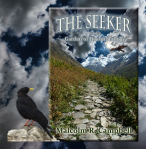 Malcolm R. Campbell
is also the author of the contemporary fantasy novels “The Seeker” and “The Sailor”
Malcolm R. Campbell
is also the author of the contemporary fantasy novels “The Seeker” and “The Sailor”


September 16, 2013
Shifting from Vacation Mode to Work Mode
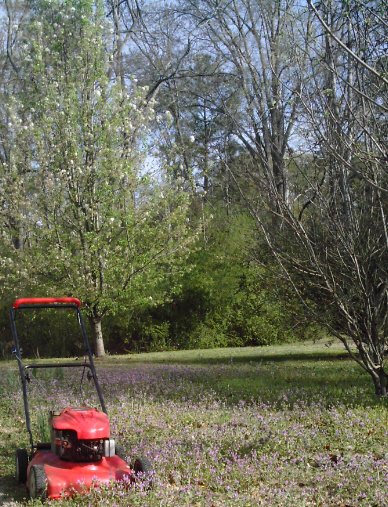 People often say they need time to recuperate from their vacations before going back to work. Yeah, my knees and ankles hurt after walking miles and miles between airport gates in order to travel from Georgia to Montana and back. But really, it’s mental relaxation I’m needing. (My brain doesn’t have a automatic transmission, so I have to manually shift from vacation mode to work mode.)
People often say they need time to recuperate from their vacations before going back to work. Yeah, my knees and ankles hurt after walking miles and miles between airport gates in order to travel from Georgia to Montana and back. But really, it’s mental relaxation I’m needing. (My brain doesn’t have a automatic transmission, so I have to manually shift from vacation mode to work mode.)
Oh, so we can’t get meals delivered to our table without going to a grocery store first?
Oh, are you telling me there’s no yard crew keeping the flowers happy and the grass green and well-mowed like there was at Glacier Park Lodge?
But, without missing a beat, the credit card bill arrived a few moments after we got home. Naturally, there was nothing in the mail from Hollywood telling me they want to pay me 100 grand to make The Seeker into a blockbuster movie. But the credit card people didn’t waste any time telling me it’s time to fill their collection plate.
As a contemporary fantasy author, I try to keep reality to a minimum, but so far, I haven’t found the right magic formula for limiting the amount of reality in real life.
Oh, so those prescription meds don’t jump into the bottles automatically unless I call them in first and then drive down to the pharmacy and pick them up?
 There’s a plus side to work mode reality. Even though work mode includes chores, it’s cheaper than vacation mode. And really, work mode food is gentler on our digestive systems.
There’s a plus side to work mode reality. Even though work mode includes chores, it’s cheaper than vacation mode. And really, work mode food is gentler on our digestive systems.
I’m glad we could catch a few Montana meals at the Park Cafe, Bison Creek Ranch, Luna’s, and the Whistle Stop cafe because the chefs at both Many Glacier Hotel and Glacier Park Lodge have a preoccupation with overly spicy food. Can’t you put a few plain dinners on the menu to give our stomachs a break?
Since I’m writing this post instead of working, you can tell I’m not completely out of vacation mode. Shifting gears is a work in progress.
-
Coming Soon: An interview with Scott Adams, the specialist in voices and dialects, who narrated the new audio edition of Jock Stewart and the Missing Sea of Fire.


September 10, 2013
Moose Drool without the Moose
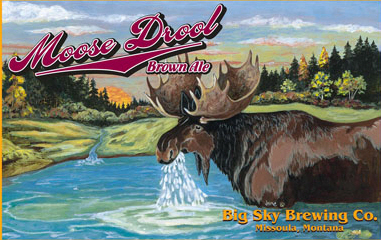 The closest my wife and I came to a moose during a ten-day trip to Glacier National Park with my brother Barry and his wife Mary was an ice cold can of Moose Drool brown ale. For the most part, the critters were absent.
The closest my wife and I came to a moose during a ten-day trip to Glacier National Park with my brother Barry and his wife Mary was an ice cold can of Moose Drool brown ale. For the most part, the critters were absent.
We discussed photo shopping this picture and saying, “Hey, guys, we saw this moose in Lake Josephine, but frankly the scenery doesn’t look much like Lake Josephine.
We did see several grizzly bears, ground squirrels, a coyote, a flash of brown that was purportedly a wolverine, and an osprey.
We were assured by the bartender at Many Glacier Hotel that Moose Drool isn’t made with actual drool. Most of the drool during the vacation was caused by various renditions of huckleberries: huckleberry water, huckleberry ice cream, huckleberry margarita, and huckleberry pie.

Grizzly bear near Many Glacier – Photo by Barry Campbell
One of the grizzly bears was on the talus high above the road between Many Glacier and Babb. We saw it several times and began to wonder if the National Park Service was paying it in huckleberries to pose there for tourists.
Seeing the cars and buses stopped for this bear–with everyone pointing–reminded me of similar scenes with black bars in the Smoky Mountains.
In spite of the lack of wildlife, we had a good trip. Well, we could have done without the cold rain and the hail storm we got into on during a hike near Hidden Falls. So far, four of my novels are partially set in Glacier. With another novel on the drawing board, it was nice to see many of the settings I plan to use.

Ground Squirrel at Logan Pass – Photo by Lesa Campbell
I have a lot of location choices. Plenty of places for action, battles, people sneaking up on other people, and the other kinds of things that happen in contemporary fantasy novels.
Coming soon, The Betrayed, the third novel in my “Garden of Heaven” series named after a Glacier Park Valley near Hidden Falls.
Next year, Aeon will complete the trilogy that includes The Sun Singer and Sarabande, both of which are partly set in Glacier Park’s Swiftcurrent Valley.
So far, I haven’t thought of a way to include Moose Drool in one of my books other than to suggest that an ice cold glass of it goes very well with the stories.
They’re books to drool for.


August 28, 2013
Asking for your readers’ time
 When new authors offer free books on their blogs and on Amazon, they sometimes find there are very few takers. “It’s free, for goodness sakes,” they say and begin to wonder if there’s something wrong with their post, their Amazon page listing or the Internet.
When new authors offer free books on their blogs and on Amazon, they sometimes find there are very few takers. “It’s free, for goodness sakes,” they say and begin to wonder if there’s something wrong with their post, their Amazon page listing or the Internet.
In an era where readers expect free and/or cheaper books, let’s set aside the argument that people don’t really value what they don’t pay for. That’s a thorny question for another day.
The first problem an unknown author has with free books is simple: prospective readers don’t even know the books exist, much less that they’re free. Obviously, if J. K. Rowling or Stephen King make their books free for a weekend, everyone will know about it. News travels fast.
But, if you’re unknown, “free” doesn’t make you known. So, before you start with “free,” the stage must be set via blogs, Facebook and other networking sites. If you have a following, people will see your posts about an upcoming “free book weekend.” If you don’t have a following, find a subject related to the book to draw people to your post. People who don’t know about you won’t search for your book and your name, but they will be searching for trending topics that might relate to your book.
Okay, what if you have a huge following and few people download your free book? There are probably a lot of reasons. One of them is, of course, that people who follow each other are doing it primarily to get their names out there, not to buy anything.
More importantly, though, is the matter of the reader’s investment. “Free” might bring a book into a reader’s house when they already know about it and already want to read it. Or, if you’re writing nonfiction–where author’s name recognition is less important than fiction–people may download “free” when it’s about their hobby, career, favorite vacation spot, or a national issue they follow.
The primary reason “free” doesn’t work for unknowns who haven’t already created a lot of buzz is very simply this: the reader doesn’t want to spend the time to read the book. Readers expect a lot of bang for their buck; more to the point, while they may waste many hours a day playing games on the Internet or watching silly television shows, they’re more protective of their time when it comes to reading books.
Mental Algorithm: DO I PURCHASE THIS BOOK? DO I DOWNLOAD IT IF IT’S FREE?
Most readers have a figurative decision tree inside their heads…how long is the book…have I heard of the author…what’s it about…are other people reading it and saying nice things about it…is there already talk of a movie deal…how many stars and how many reviews does it have on Amazon…are Kirkus, Publishers Weekly, The Huffington Post, Flavorwire, Slate, Salon and the nearest metro newspaper talking about either the book or the author?
You see where that’s going. Each time the reader says “no” in the decision tree, the book becomes less likely to be downloaded for free, much less purchased.
We can argue all we want that the reader spends time and money on other things, things that may seem frivolous when compared to the book. The thing is, those other things are known things. On Facebook, Candy Crush Saga provides a certain kind of fun within known time frames. A Happy Meal at McDonalds provides a known eating experience.
What an unknown book, free or marked down, provides for the amount of time it will take the average reader to read it, is unknown. As long as it is, “free” will mean very little to prospective readers who are already zoned out and maxed out by the thousand other prospective free/cheap books they can download today, tomorrow and for the rest of their lives.
“Free” may be nice, but it isn’t magic. You need better than free to tempt your readers.


August 26, 2013
Book Review: ‘Mister Max’ by Cynthia Voigt
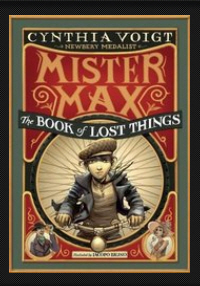 Newbery medalist Cynthia Voigt (“Kingdom,” “Tillerman” and “Bad Girls” series) brings her considerable storytelling experience to an inventive adventure with a unique and resourceful protagonist. Intended for readers from 8-12, Mister Max: The Book of Lost Things is the first in a planned trilogy about the likeable and realistically drawn twelve-year-old Maximilian Starling.
Newbery medalist Cynthia Voigt (“Kingdom,” “Tillerman” and “Bad Girls” series) brings her considerable storytelling experience to an inventive adventure with a unique and resourceful protagonist. Intended for readers from 8-12, Mister Max: The Book of Lost Things is the first in a planned trilogy about the likeable and realistically drawn twelve-year-old Maximilian Starling.
Day to day, he’s just Max, a schoolboy who doesn’t quite fit in with his peers because his parents are larger-than-life and excessively flamboyant theater people who find drama in everything. Just Max is just “different.” Max’s has a nagging problem: his parents are lost. They’re lost as in missing, misplaced, misunderstood, potentially kidnapped, or enacting a drama without due regard to Max who’s been left behind in an empty house.
Fortunately, his grandmother lives nearby. Unfortunately she is, in Max’s opinion, inclined to be bossy. They agree, however, that it’s better for Max’s school to assume Max is on a trip with his parents. After all, that was the plan before William and Mary Starling of the Starling Theatrical Company disappeared. Grammie and Max also agree that the authorities, whoever they may be, need not know about Max’s mostly empty house.
Readers will identify with Max because, like any twelve-year-old with lost parents, Max is a bit overwhelmed by the questions and emotions racing through his head. However, he is determined to meet the challenges of independence head on. He needs money and that means he needs a job even though nobody seems to be hiring twelve-year-old applicants without experience.
Voigt has blessed her protagonist with a skill he doesn’t immediately see has having any value outside the walls of the Starling Theatrical Company: he knows about roles and costumes. While he doesn’t really want to call himself a private detective, the world of roles and costumes and his preoccupation with that which is lost make him adept at helping others–at a reasonable fee–find what they need to find.
The story is filled with memorable characters, humor and a series of lost and found adventures that will stir up the imaginations of young readers who might speculate about what they would do if their parents were lost. Voigt’s words, which (figuratively, of course) dance and sparkle on the page, are supported by Iacopo Bruno’s magical illustrations.
The illustrations and plot twists bring a heady 19th-century daring-do to a story that sweeps toward a suitably over-the-top cliffhanger ending that should satisfy readers while Voigt decides how Max is going to find his way out of his next dilemma. Young readers will find that Mister Max is filled with wonder, mystery and plenty of adventure.
-
Malcolm R. Campbell is the author of contemporary fantasy short stories and novels including “The Seeker” and “Emily’s Stories.”


August 23, 2013
On location: Glacier Park’s Iceberg Lake
I used Glacier National Park’s Iceberg Lake in “High Country Painter,” of the three short stories in my family-oriented e-book/audio book Emily’s Stories.
Where Is It?
 Iceberg Lake is a 5.9- mile hike from Many Glacier Hotel on the east side of Montana’s Glacier National Park. The lake, which is frozen over during the winter months, is named for the chunks of ice that float in it throughout the summer. It’s one of the most popular trails in the area.
Iceberg Lake is a 5.9- mile hike from Many Glacier Hotel on the east side of Montana’s Glacier National Park. The lake, which is frozen over during the winter months, is named for the chunks of ice that float in it throughout the summer. It’s one of the most popular trails in the area.
En route to the lake from the hotel, the elevation increases 1,200 feet, however most of the uphill sections of the trail are gradual. For those who haven’t yet gotten used to the elevation or long walks, the hike provides a half-day of exercise.
In his book The Best of Glacier National Park, Alan Leftbridge lists Iceberg Lake as one as one of Glacier’s seven best day hikes. His level of difficulty for the hike is moderate. Hiking in Glacier calls the hike strenuous. (I guess it depends of whether or not one is out of shape!) If you don’t have a hiking guidebook, this web site provides a good overview of the trip.
How I Used it In the Story

Trail to Iceberg Lake – Photo by GlacierGuyMT
Young Emily Walker and her family travel from Florida to Glacier National Park for a family vacation. She accompanies her father on the hike while her mother spends the day around the hotel. Since she occasionally talks to birds and spirits, she knows something unusual will happen at the lake.
Why I Used the Lake

Iceberg Lake
Emily and her father are used to the sinkhole lakes and blackwater rivers in the Florida Panhandle. I wanted to put them into a new environment. The arête in the picture is called the Garden Wall and it not only provides a lot of ice and snow to look at, but frequent mountain goats as well.
The lake sits in a cirque, a carved-out bowl left by ancient glaciers, and since it’s such a popular spot, hikers will almost always find ground squirrels and chipmunks there begging for food. The lake sits in bear country, so it’s always good to check with the rangers for to see if there have been any grizzly bears in the area before you begin your hike.
The hike also features many wild flowers as well as some very different views of the mountains than one sees from the hotel. There are good views of many rock formations and other features of glaciation,
The first mile of the hike is on the paved road that connects the hotel complex to the camp store and the campground; park your car at the store to save a bit of walking.
Excerpt from Emily’s Stories
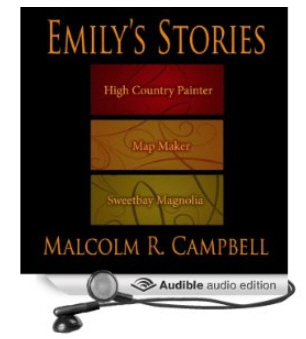
Available on Kindle and as an audio book
The horizon was hidden by a grey wall of rock which, according to the pack, also concealed incoming storms; now, carrying rain jackets on a sunny day made sense. By the time they passed the noisy waterfall and strolled through lacey-white bear grass (without bears) and scattered Indian paintbrush that gentled the grey rock (“limestone,” her dad said, descriptively), Emily was ready for lunch.
Deep snow lay hard-packed around the lake’s far shore where the limestone wall created a playground for mountain goats running across their grey and white world as nimbly as Southern chameleons ran along the Walters’ brick house. Sunny Florida was, as advertised, sunny and hot, but here deep summer had only melted the ice off half of the lake’s surface.
“I am astonished,” said Emily, dropping her knapsack on the ground and running down to the water. The water was as cold as it looked.
“Punkin, ‘astonished’ is a new word for you,” her dad said. He knelt down and splashed water over his
face.
-
Summing Everything Up
My teenaged protagonist talks to birds and spirits, so her stories are always set outdoors. Like other visitors to the hotel, the hike to the lake is one she would probably take. It provides great scenery for Emily to experience with her father as long with the possibility a bear might appear.
I worked at the hotel as a bellman for two summers and walked up to this lake many times. Using it in the story is an example of a writer writing what he knows.


August 20, 2013
‘The Sun Singer’ and ‘Sarabande’ are temporarily out of print
 While my contemporary fantasies The Sun Singer (2004, 2010) and Sarabande (2011) are momentarily still displaying on Amazon and other bookseller sites, the novels will soon be out of print.
While my contemporary fantasies The Sun Singer (2004, 2010) and Sarabande (2011) are momentarily still displaying on Amazon and other bookseller sites, the novels will soon be out of print.
These are the first two books in a planned trilogy and will reappear at a later date. Meanwhile, work continues on the third book which will wrap up the story lines of Robert Adams, Sarabande, Tom Elliott and Gem.
Thanks to all of you who have read and enjoyed the books and often left reviews out on Amazon. The third book will also be set in Glacier National Park. Stay tuned.
Malcolm

Kindle Edition






